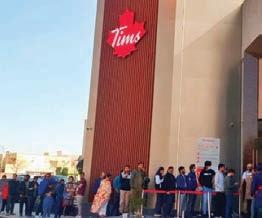
3 minute read
Fitch downgrades Pakistan’s
issuer default rating to CCC-
LIQUIDITY CRISIS, POLICY RISKS AND UNDER PRESSURE RESERVES REGARDED AS KEY DRIVERS BEHIND FALL
Advertisement
The international ratings agency, Fitch has downgraded Pakistan’s Long-Term Foreign-Currency Issuer Default Rating (IDR) to ‘CCC-‘, from ‘CCC+’.
An Issuer Default Rating (IDR) is an assessment of an issuer’s relative vulnerability to default on financial obligations, and is intended to be comparable across industry groups and countries. Issuers often carry both long-term and short-term IDRs.
In this particular case, Pakistan’s likelihood to default on its longterm foreign currency obligations, has been deemed more plausible than before. Ratings don’t typically change the chances of default. Rather, they are forward-looking opinions on the relative ability of an entity or obligation to meet financial commitments.
The ratings agency has not given an outlook like usual. Typically, Fitch gives an outlook of the entities that it rates, be it “stable” or “positive” or “negative”. However, the agency clarified in its statement that below the CCC+ rating, the agency does not give outlooks.
According to Fitch, the key drivers in the fall of Pakistan’s rating were a number of factors that can be linked to the current financial crisis. The agency states that even while assuming a successful conclusion to the 9th review of the IMF program, the country’s forex outlook is bound to worsen, considering the coming elections and subsequent policy instability. Under such circumstances, either default or a restructuring of debts is highly likely. It is important to note, that if the staff level agreement is not reached on the IMF program, the current position of Fitch would be considered an overstatement, about the country’s ability to fulfil its obligations.
The ratings agency also points towards Pakistan’s falling CAD figures that have been
Coffee trumps economic crisis as tim Hortons opens in Pakistan
Coffee Chain Set To Open Two More Outlets In Lahore
profIt ReuteRS maintained due to the restrictions. The agency fears that the figures are bound to rise once the economy opens up under the strict IMF conditions. As per Fitch, “(Pakistan’s) External public-debt maturities in the remainder of the fiscal year ending June 2023 (FY23) amount to over $7 billion and will remain high in FY24”. Under these circumstances, the country’s already under pressure reserves are very likely to crumble without external aid.
It is important to note that CCC- is one of the most dangerous categories for a sovereign entity. Typically, countries don’t see the light of the R’D or the D category but entities that do, do so after they have entered bankruptcy filings.
Pakistanis are queuing for hours to grab coffee and pastries from Canadian chain Tim Hortons, which opened its first outlet in the South Asian country this week just as its economic crisis took a turn for the worse. In less than a month, Pakistan’s currency has lost more than a quarter of its value against the U.S. dollar, and fuel prices have risen by almost a fifth as the government implemented fiscal measures that are prerequisite to unlocking funds from an International Monetary Fund bailout. Inflation in January spiked to 27% year-on-year, the highest in more than a decade, and the government only has enough foreign reserves to pay for just over three weeks of imports. All that hasn’t stopped scores of Pakistanis from thronging to the cafe since it opened on Saturday at an upmarket Lahore shopping mall. Tim Hortons is owned by Restaurant Brands International Inc (RBI) (QSR.TO), , a Toronto-based company that also owns other fast food brands including Burger King and Popeyes. “Higher prices don’t really matter for the class of people coming here,” Ahmad Javed, a medical student who used to go to Tim Hortons while he was living in Canada, told Reuters as he queued up. “Rich people in Pakistan are getting richer, the poor are becoming poorer while the middle class is struggling.”

According to its online menu, a small brewed coffee costs 350 rupees ($1.30), while a large flavoured coffee is twice as much. By comparison, the average government-mandated minimum wage is 25,000 rupees ($94) a month.
With a population of more than 230 million and a $350-billion economy, Pakistan remains a growth market for fast-food companies. McDonald’s (MCD.N), Retail Food Group (RFG.AX)-owned Gloria Jean’s Coffee and Yum Brands Inc (YUM.N)-owned Pizza Hut are among the international brands with outlets in Pakistan. Tim Hortons is set to open another two outlets in Lahore, RBI said in a statement. Pakistani firm Blue Foods operates the franchise. Both companies declined to give any details about the outlet’s sales in the opening week. For students such as Pareeshay Khan, the brand’s social media traction trumps the cost of the coffee. “I’m here to taste the coffee that’s the top social media trend. I don’t know about the price, nor do I care.”




